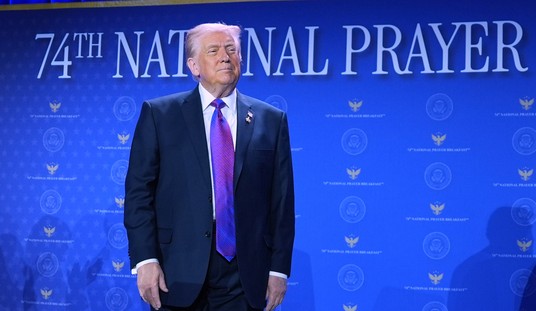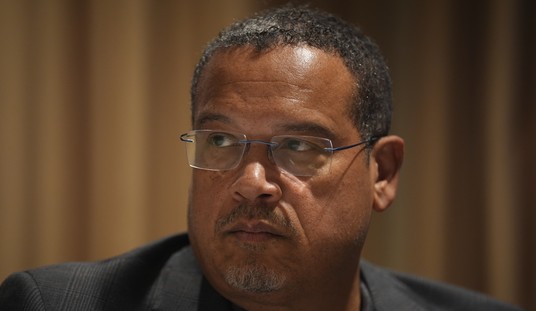As expected, the Vatican released Pope Francis’ much-anticipated encyclical on the environment this morning, and as anticipated, it demands a radical departure from the current status quo. Titled Laudato, Sí in honor of his namesake St. Francis of Assisi, the Pope calls for a “bold cultural revolution” in apparent ignorance of the horrors meted out in the previous century under that rubric, to combat evils in the present time, both imagined (or at least highly speculative) and real. The main focus for the media will be on the pontifical call to arms on climate change, but there’s at least a few points that the cheerleaders on climate won’t like, either — and perhaps especially a Western media bedazzled by gender-bending and Malthusian obsessions.
John Thavis sums up broadly what Francis argues:
The pope said moderating the production-consumption model and slowing the “constant flood of new products” is key to restoring ecological balance in the world. The prevailing economic system, he said, has led to destruction of rain forests, over-fishing of ocean waters, industrialized farming and loss of local biodiversity, and mining techniques that strip developing countries of resources and leave behind only problems and pollution.
The pope blames wealthy countries for their disproportionate use of natural resources, and says that while the world’s poor are often mentioned in international discussions, their struggles seem to be an afterthought. “Indeed, when all is said and done, they frequently remain at the bottom of the pile,” he says.
Radical economic change is needed to fix the situation, he says.
The heart of the climate change argument, and its weaknesses, appear in paragraph 23:
The climate is a common good, belonging to all and meant for all. At the global level, it is a complex system linked to many of the essential conditions for human life. A very solid scientific consensus indicates that we are presently witnessing a disturbing warming of the climatic system. In recent decades this warming has been accompanied by a constant rise in the sea level and, it would appear, by an increase of extreme weather events, even if a scientifically determinable cause cannot be assigned to each particular phenomenon. Humanity is called to recognize the need for changes of lifestyle, production and consumption, in order to combat this warming or at least the human causes which produce or aggravate it. It is true that there are other factors (such as volcanic activity, variations in the earth’s orbit and axis, the solar cycle), yet a number of scientific studies indicate that most global warming in recent decades is due to the great concentration of greenhouse gases (carbon dioxide, methane, nitrogen oxides and others) released mainly as a result of human activity. Concentrated in the atmosphere, these gases do not allow the warmth of the sun’s rays reflected by the earth to be dispersed in space. The problem is aggravated by a model of development based on the intensive use of fossil fuels, which is at the heart of the worldwide energy system. Another determining factor has been an increase in changed uses of the soil, principally deforestation for agricultural purposes.
It’s important to note a couple of points at the very beginning. One, there has not been significant warning for at least fifteen years, which undermines all of the causative arguments here and further down into the encyclical. The actual period of warming in the last decades of the 20th century seems to correlates better to the rapid increase of chlorofluorocarbons (CFCs) in consumer products, which really did do damage to the ozone layer. The ban on CFCs for consumer products has largely corrected that problem, which may be one reason why the warming has not continued. The problem with the above paragraph and the entire section it leads is that bases its conclusions on arguments on the verge of being debunked. The global-warming models have failed; the “extreme weather” has actually decreased and has little connection to whatever warming trends might have occurred; science is not a “consensus,” but a model in which hypotheses have to be proven and repeatable. Galileo could have explained the value of “consensus” to Francis.
Second, the Holy Father’s argument here seems to be one of convenience — like much of what we hear from global-warming advocates. The Catholic Church has always advocated for environmental care; Francis quotes both Benedict XVI and St. John Paul II on this point to underscore the teaching that humans are stewards of creation and not its master. The Church has always warned against excessive consumerism and unequal consumption of resources, and called for Catholics to work for equity in both areas through personal action and example. In Laudato, Sí, Francis has used climate change as a hook to promote the broader Catholic environmental and economic agenda, just as other AGW advocates use it as a hook to advance their political causes, especially collectivism, redistribution of wealth, and global government.
That’s the temptation inherent in anthropogenic global-warming theories: embracing them can justify practically anything. That’s also how we’ve seen other “cultural revolutions” justified, too, through supposedly benign efforts to save humanity from itself.
Actually, the Pope is on firmer ground with other points about the environment. There is little doubt that humanity has created “filth” out of benevolence, and poisoned the environment through exploitation. What gets missed in this blanket indictment is that this tends to be much worse in countries with no political accountability, and in a direct ratio to the oppression of the people who live in those environments. It was the nations of Asia — Russia and China — who adopted “bold cultural revolutions” that destroyed their environments on a staggering scale. Nations with free choice and governance through democratic processes were forced to fix those problems in the post-industrial period. Unfortunately, the global governance structures of today are dominated by the former rather than the latter, and the use of such structures to dictate “climate justice” (not a term Francis uses in the encyclical, but one used by the advocates cheering it) will only make things worse rather than better. Subsidiarity, which is also a valued Catholic teaching, works much more effectively than top-down autocracy.
Fortunately, papal infallibility does not extend to science. Francis is correct that Catholic teaching instructs us to be stewards of creation and not its exploiters, and that we must work to have all our brothers and sisters get their share of its blessings. That doesn’t equate to jumping off a Malthusian cliff or consigning ourselves to nutty theories based mostly on the political agendas of its advocates.
Interestingly, Francis actually agrees on this point. In paragraph 50, Francis blasts the Malthusians:
Instead of resolving the problems of the poor and thinking of how the world can be different, some can only propose a reduction in the birth rate. At times, developing countries face forms of international pressure which make economic assistance contingent on certain policies of “reproductive health”. Yet “while it is true that an unequal distribution of the population and of available resources creates obstacles to development and a sustainable use of the environment, it must nonetheless be recognized that demographic growth is fully compatible with an integral and shared development”.
And perhaps even more intriguingly, Francis decided to take this moment to lash out at the media cheerleading over gender confusion, accusing the world of cowardice on the blessing of sexual differences in the attempt to annihilate them. After all, if we are to revere nature to the point of arrogance over a macro system like climate, why then do we deny science in the particular and personal? Paragraph 155:
Human ecology also implies another profound reality: the relationship between human life and the moral law, which is inscribed in our nature and is necessary for the creation of a more dignified environment. Pope Benedict XVI spoke of an “ecology of man”, based on the fact that “man too has a nature that he must respect and that he cannot manipulate at will”.[120] It is enough to recognize that our body itself establishes us in a direct relationship with the environment and with other living beings. The acceptance of our bodies as God’s gift is vital for welcoming and accepting the entire world as a gift from the Father and our common home, whereas thinking that we enjoy absolute power over our own bodies turns, often subtly, into thinking that we enjoy absolute power over creation. Learning to accept our body, to care for it and to respect its fullest meaning, is an essential element of any genuine human ecology. Also, valuing one’s own body in its femininity or masculinity is necessary if I am going to be able to recognize myself in an encounter with someone who is different. In this way we can joyfully accept the specific gifts of another man or woman, the work of God the Creator, and find mutual enrichment. It is not a healthy attitude which would seek “to cancel out sexual difference because it no longer knows how to confront it”.[121]
Don’t expect to hear too much about those points in the media gushing over Francis’ call for a “bold cultural revolution” on climate change. Perhaps in later encyclicals, the pontiff can reflect on the bloody history of such calls in the recent past, and reconsider its use in the future.
Update: I’m still reading through some of the other portions of the encyclical. Pope Francis also uses his defense of nature as an offense against abortion and embryonic experimentation in paragraphs 119-120:
Nor must the critique of a misguided anthropocentrism underestimate the importance of interpersonal relations. If the present ecological crisis is one small sign of the ethical, cultural and spiritual crisis of modernity, we cannot presume to heal our relationship with nature and the environment without healing all fundamental human relationships. Christian thought sees human beings as possessing a particular dignity above other creatures; it thus inculcates esteem for each person and respect for others. Our openness to others, each of whom is a “thou” capable of knowing, loving and entering into dialogue, remains the source of our nobility as human persons. A correct relationship with the created world demands that we not weaken this social dimension of openness to others, much less the transcendent dimension of our openness to the “Thou” of God. Our relationship with the environment can never be isolated from our relationship with others and with God. Otherwise, it would be nothing more than romantic individualism dressed up in ecological garb, locking us into a stifling immanence.
Since everything is interrelated, concern for the protection of nature is also incompatible with the justification of abortion. How can we genuinely teach the importance of concern for other vulnerable beings, however troublesome or inconvenient they may be, if we fail to protect a human embryo, even when its presence is uncomfortable and creates difficulties? “If personal and social sensitivity towards the acceptance of the new life is lost, then other forms of acceptance that are valuable for society also wither away”.
True — but that argument stands on its own. It doesn’t rely on a global-warming premise, nor should it be connected to it.
Update: From commenter cthemfly: “Thus, we as Catholics need to explain that this encyclical cannot be dignified as anything other than an opinion piece one might read in the NYT.” We should at least explain that this is not doctrine, or even teaching in the sense of the Magisterium in the context of climate change, but a personal reflection and appeal from Francis.
Update: Cleaned up confusing sentence structure on my point about subsidiarity. Thanks to Phil H for the heads-up.








Join the conversation as a VIP Member